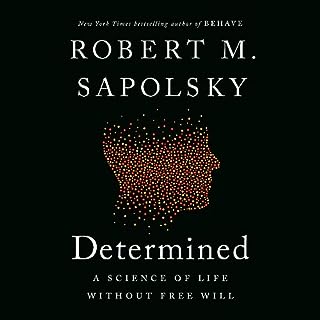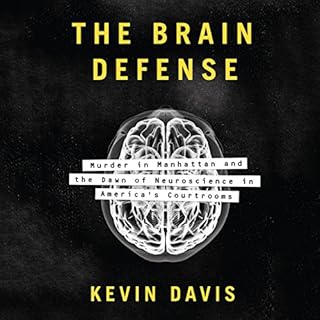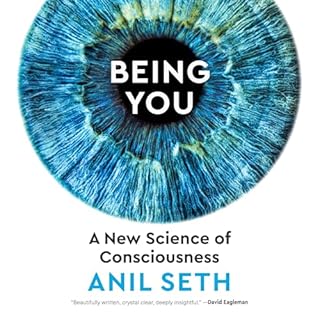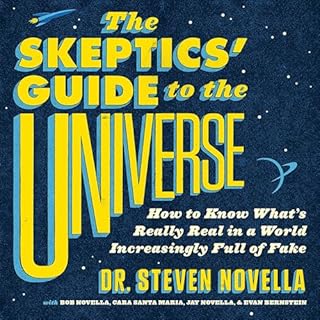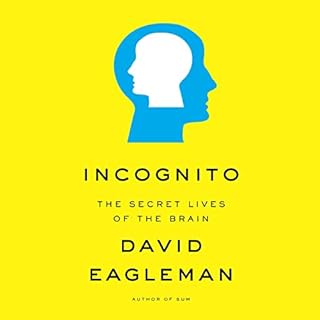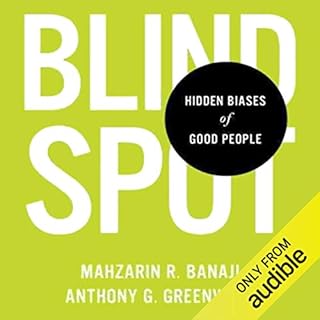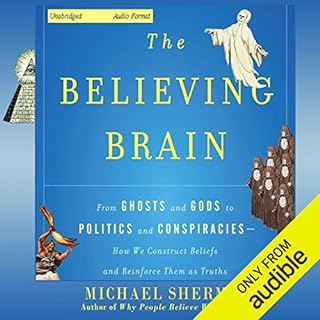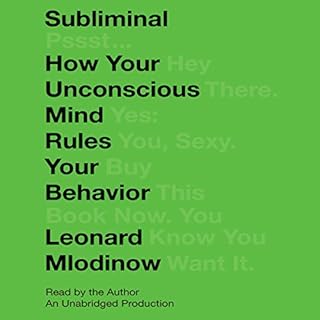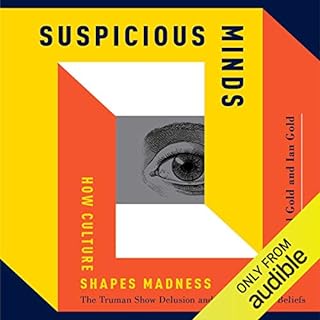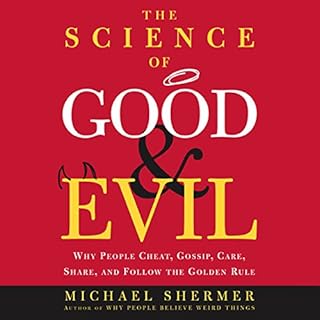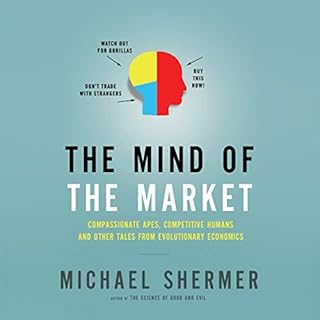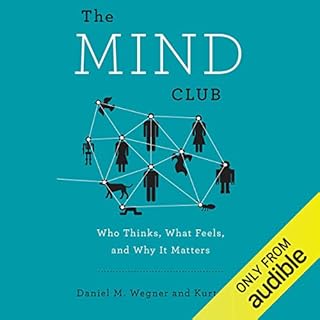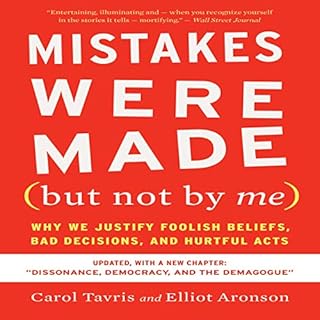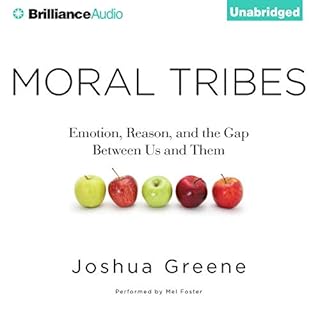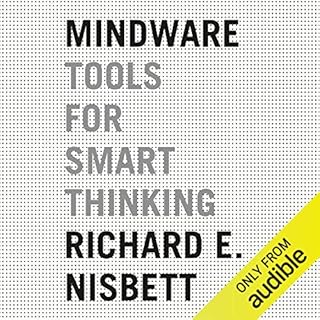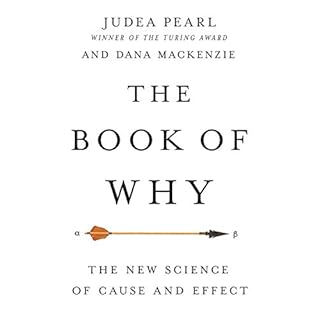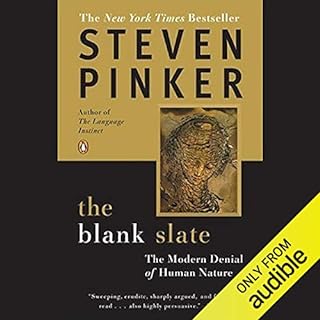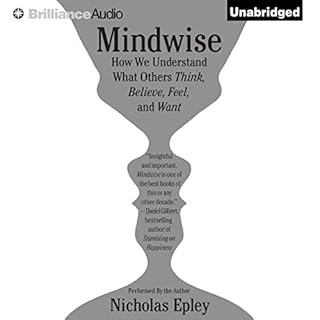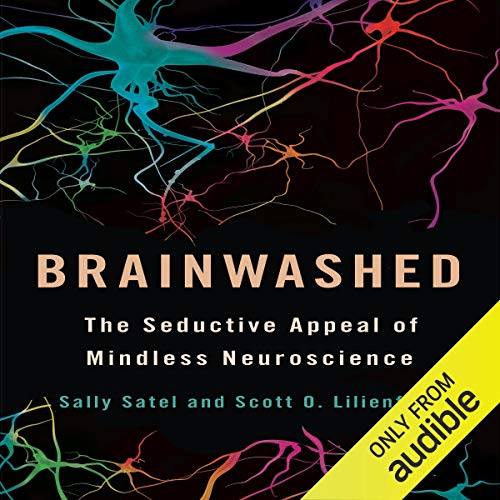
Brainwashed
The Seductive Appeal of Mindless Neuroscience
Failed to add items
Add to Cart failed.
Add to Wish List failed.
Remove from wishlist failed.
Adding to library failed
Follow podcast failed
Unfollow podcast failed
 Prime members: New to Audible?
Prime members: New to Audible?Get 2 free audiobooks during trial.
Buy for $24.25
No default payment method selected.
We are sorry. We are not allowed to sell this product with the selected payment method
-
Narrated by:
-
Jean Barrett
About this listen
In recent years, the advent of MRI technology seems to have unlocked the secrets of the human mind, revealing the sources of our deepest desires, intentions, and fears. As renowned psychiatrist and scholar Sally Satel and psychologist Scott O. Lilienfeld demonstrate in Brainwashed, however, the explanatory power of brain scans in particular and neuroscience more generally has been vastly overestimated. Although acknowledging its tremendous potential, the authors argue that the overzealous application of the burgeoning field of brain science has put innocent people in jail, prevented addicts from healing themselves, and undermined notions of free will and responsibility.
A provocative challenge to the use and abuse of a seductive science, Brainwashed offers an essential corrective to determinist explanations of human behavior.
©2013 Sally Satel and Scott O. Lilienfeld (P)2013 Audible, Inc.Listeners also enjoyed...
-
Determined
- A Science of Life Without Free Will
- By: Robert M. Sapolsky
- Narrated by: Kaleo Griffith
- Length: 13 hrs and 42 mins
- Unabridged
-
Overall4.5 out of 5 stars 780
-
Performance4.5 out of 5 stars 703
-
Story4.5 out of 5 stars 703
Robert Sapolsky’s Behave, his now classic account of why humans do good and why they do bad, pointed toward an unsettling conclusion: We may not grasp the precise marriage of nature and nurture that creates the physics and chemistry at the base of human behavior, but that doesn’t mean it doesn’t exist. Now, in Determined, Sapolsky takes his argument all the way, mounting a brilliant (and in his inimitable way, delightful) full-frontal assault on the pleasant fantasy that there is some separate self telling our biology what to do.
-
4 out of 5 stars
-
Abridged - no Appendix!
- By Amazon Customer on 11-02-23
-
How Emotions Are Made
- The Secret Life of the Brain
- By: Lisa Feldman Barrett
- Narrated by: Cassandra Campbell
- Length: 14 hrs and 32 mins
- Unabridged
-
Overall4.5 out of 5 stars 2,492
-
Performance4.5 out of 5 stars 2,121
-
Story4.5 out of 5 stars 2,105
The science of emotion is in the midst of a revolution on par with the discovery of relativity in physics and natural selection in biology. Leading the charge is psychologist and neuroscientist Lisa Feldman Barrett, whose research overturns the long-standing belief that emotions are automatic, universal, and hardwired in different brain regions. Instead, Barrett shows, we construct each instance of emotion through a unique interplay of brain, body, and culture.
-
5 out of 5 stars
-
Emotions are not things!!!!!!
- By Gary on 03-14-17
-
Seven and a Half Lessons About the Brain
- By: Lisa Feldman Barrett
- Narrated by: Lisa Feldman Barrett
- Length: 3 hrs and 53 mins
- Unabridged
-
Overall4.5 out of 5 stars 751
-
Performance4.5 out of 5 stars 622
-
Story4.5 out of 5 stars 612
Have you ever wondered why you have a brain? Let renowned neuroscientist Lisa Feldman Barrett demystify that big gray blob between your ears. In seven short essays (plus a bite-sized story about how brains evolved), this slim, entertaining, and accessible collection reveals mind-expanding lessons from the front lines of neuroscience research. You'll learn where brains came from, how they're structured (and why it matters), and how yours works in tandem with other brains to create everything you experience.
-
3 out of 5 stars
-
slow reader & little bit of a Wokie
- By darren on 06-01-21
-
Against the Grain
- A Deep History of the Earliest States
- By: James C. Scott
- Narrated by: Eric Jason Martin
- Length: 8 hrs and 35 mins
- Unabridged
-
Overall4.5 out of 5 stars 867
-
Performance4.5 out of 5 stars 722
-
Story4.5 out of 5 stars 717
Why did humans abandon hunting and gathering for sedentary communities dependent on livestock and cereal grains and governed by precursors of today's states? Most people believe that plant and animal domestication allowed humans, finally, to settle down and form agricultural villages, towns, and states, which made possible civilization, law, public order, and a presumably secure way of living. But archaeological and historical evidence challenges this narrative.
-
4 out of 5 stars
-
World without Women
- By Paul Richards on 04-28-18
By: James C. Scott
-
Maps of Meaning
- The Architecture of Belief
- By: Jordan B. Peterson
- Narrated by: Jordan B. Peterson
- Length: 30 hrs and 52 mins
- Unabridged
-
Overall4.5 out of 5 stars 5,052
-
Performance4.5 out of 5 stars 4,334
-
Story4.5 out of 5 stars 4,303
From the author of 12 Rules for Life: An Antidote to Chaos comes a provocative hypothesis that explores the connection between what modern neuropsychology tells us about the brain and what rituals, myths, and religious stories have long narrated. A cutting-edge work that brings together neuropsychology, cognitive science, and Freudian and Jungian approaches to mythology and narrative, Maps of Meaning presents a rich theory that makes the wisdom and meaning of myth accessible to the critical modern mind.
-
4 out of 5 stars
-
This is NOT an easy book
- By Stephen on 06-19-18
-
The Canceling of the American Mind
- Cancel Culture Undermines Trust, Destroys Institutions, and Threatens Us All—but There Is a Solution
- By: Greg Lukianoff, Rikki Schlott
- Narrated by: Rikki Schlott, Kirby Heyborne
- Length: 7 hrs and 30 mins
- Unabridged
-
Overall4.5 out of 5 stars 269
-
Performance4 out of 5 stars 246
-
Story4.5 out of 5 stars 245
Cancel culture is a new phenomenon, and The Canceling of the American Mind is the first book to codify it and survey its effects, including hard data and research on what cancel culture is and how it works, along with hundreds of new examples showing the left and right both working to silence their enemies.
-
5 out of 5 stars
-
Good book, Important information, poorly read
- By pj on 12-08-23
By: Greg Lukianoff, and others
-
Determined
- A Science of Life Without Free Will
- By: Robert M. Sapolsky
- Narrated by: Kaleo Griffith
- Length: 13 hrs and 42 mins
- Unabridged
-
Overall4.5 out of 5 stars 780
-
Performance4.5 out of 5 stars 703
-
Story4.5 out of 5 stars 703
Robert Sapolsky’s Behave, his now classic account of why humans do good and why they do bad, pointed toward an unsettling conclusion: We may not grasp the precise marriage of nature and nurture that creates the physics and chemistry at the base of human behavior, but that doesn’t mean it doesn’t exist. Now, in Determined, Sapolsky takes his argument all the way, mounting a brilliant (and in his inimitable way, delightful) full-frontal assault on the pleasant fantasy that there is some separate self telling our biology what to do.
-
4 out of 5 stars
-
Abridged - no Appendix!
- By Amazon Customer on 11-02-23
-
How Emotions Are Made
- The Secret Life of the Brain
- By: Lisa Feldman Barrett
- Narrated by: Cassandra Campbell
- Length: 14 hrs and 32 mins
- Unabridged
-
Overall4.5 out of 5 stars 2,492
-
Performance4.5 out of 5 stars 2,121
-
Story4.5 out of 5 stars 2,105
The science of emotion is in the midst of a revolution on par with the discovery of relativity in physics and natural selection in biology. Leading the charge is psychologist and neuroscientist Lisa Feldman Barrett, whose research overturns the long-standing belief that emotions are automatic, universal, and hardwired in different brain regions. Instead, Barrett shows, we construct each instance of emotion through a unique interplay of brain, body, and culture.
-
5 out of 5 stars
-
Emotions are not things!!!!!!
- By Gary on 03-14-17
-
Seven and a Half Lessons About the Brain
- By: Lisa Feldman Barrett
- Narrated by: Lisa Feldman Barrett
- Length: 3 hrs and 53 mins
- Unabridged
-
Overall4.5 out of 5 stars 751
-
Performance4.5 out of 5 stars 622
-
Story4.5 out of 5 stars 612
Have you ever wondered why you have a brain? Let renowned neuroscientist Lisa Feldman Barrett demystify that big gray blob between your ears. In seven short essays (plus a bite-sized story about how brains evolved), this slim, entertaining, and accessible collection reveals mind-expanding lessons from the front lines of neuroscience research. You'll learn where brains came from, how they're structured (and why it matters), and how yours works in tandem with other brains to create everything you experience.
-
3 out of 5 stars
-
slow reader & little bit of a Wokie
- By darren on 06-01-21
-
Against the Grain
- A Deep History of the Earliest States
- By: James C. Scott
- Narrated by: Eric Jason Martin
- Length: 8 hrs and 35 mins
- Unabridged
-
Overall4.5 out of 5 stars 867
-
Performance4.5 out of 5 stars 722
-
Story4.5 out of 5 stars 717
Why did humans abandon hunting and gathering for sedentary communities dependent on livestock and cereal grains and governed by precursors of today's states? Most people believe that plant and animal domestication allowed humans, finally, to settle down and form agricultural villages, towns, and states, which made possible civilization, law, public order, and a presumably secure way of living. But archaeological and historical evidence challenges this narrative.
-
4 out of 5 stars
-
World without Women
- By Paul Richards on 04-28-18
By: James C. Scott
-
Maps of Meaning
- The Architecture of Belief
- By: Jordan B. Peterson
- Narrated by: Jordan B. Peterson
- Length: 30 hrs and 52 mins
- Unabridged
-
Overall4.5 out of 5 stars 5,052
-
Performance4.5 out of 5 stars 4,334
-
Story4.5 out of 5 stars 4,303
From the author of 12 Rules for Life: An Antidote to Chaos comes a provocative hypothesis that explores the connection between what modern neuropsychology tells us about the brain and what rituals, myths, and religious stories have long narrated. A cutting-edge work that brings together neuropsychology, cognitive science, and Freudian and Jungian approaches to mythology and narrative, Maps of Meaning presents a rich theory that makes the wisdom and meaning of myth accessible to the critical modern mind.
-
4 out of 5 stars
-
This is NOT an easy book
- By Stephen on 06-19-18
-
The Canceling of the American Mind
- Cancel Culture Undermines Trust, Destroys Institutions, and Threatens Us All—but There Is a Solution
- By: Greg Lukianoff, Rikki Schlott
- Narrated by: Rikki Schlott, Kirby Heyborne
- Length: 7 hrs and 30 mins
- Unabridged
-
Overall4.5 out of 5 stars 269
-
Performance4 out of 5 stars 246
-
Story4.5 out of 5 stars 245
Cancel culture is a new phenomenon, and The Canceling of the American Mind is the first book to codify it and survey its effects, including hard data and research on what cancel culture is and how it works, along with hundreds of new examples showing the left and right both working to silence their enemies.
-
5 out of 5 stars
-
Good book, Important information, poorly read
- By pj on 12-08-23
By: Greg Lukianoff, and others
-
The Brain Defense
- Murder in Manhattan and the Dawn of Neuroscience in America's Courtrooms
- By: Kevin Davis
- Narrated by: Jim Frangione
- Length: 9 hrs and 27 mins
- Unabridged
-
Overall4.5 out of 5 stars 62
-
Performance4.5 out of 5 stars 58
-
Story4.5 out of 5 stars 58
In 1991 the police were called to East 72nd St. in Manhattan, where a woman's body had fallen from a 12th-story window. The woman's husband, Herbert Weinstein, soon confessed to having hit and strangled his wife after an argument, then dropping her body out of their apartment window to make it look like a suicide. The 65-year-old Weinstein, a quiet, unassuming retired advertising executive, had no criminal record, no history of violent behavior - not even a short temper.
-
5 out of 5 stars
-
As riveting as a crime thriller; fascinating subj
- By Lindsay S. Nixon on 03-05-17
By: Kevin Davis
-
Being You
- A New Science of Consciousness
- By: Anil Seth
- Narrated by: Anil Seth
- Length: 9 hrs and 46 mins
- Unabridged
-
Overall4.5 out of 5 stars 371
-
Performance4.5 out of 5 stars 314
-
Story4.5 out of 5 stars 308
What does it mean to “be you” - that is, to have a specific, conscious experience of the world around you and yourself within it? There may be no more elusive or fascinating question. Historically, humanity has considered the nature of consciousness to be a primarily spiritual or philosophical inquiry, but scientific research is now mapping out compelling biological theories and explanations for consciousness and selfhood.
-
2 out of 5 stars
-
Not engaging, nothing new
- By Tristan on 11-22-21
By: Anil Seth
-
The Moral Landscape
- How Science Can Determine Human Values
- By: Sam Harris
- Narrated by: Sam Harris
- Length: 6 hrs and 48 mins
- Unabridged
-
Overall4.5 out of 5 stars 4,473
-
Performance4.5 out of 5 stars 3,643
-
Story4.5 out of 5 stars 3,585
In this explosive new book, Sam Harris tears down the wall between scientific facts and human values, arguing that most people are simply mistaken about the relationship between morality and the rest of human knowledge. Harris urges us to think about morality in terms of human and animal well-being, viewing the experiences of conscious creatures as peaks and valleys on a "moral landscape".
-
5 out of 5 stars
-
Read it
- By Paul on 11-23-10
By: Sam Harris
-
Free Will
- By: Sam Harris
- Narrated by: Sam Harris
- Length: 1 hr and 14 mins
- Unabridged
-
Overall4.5 out of 5 stars 5,264
-
Performance4.5 out of 5 stars 4,544
-
Story4.5 out of 5 stars 4,459
A belief in free will touches nearly everything that human beings value. It is difficult to think about law, politics, religion, public policy, intimate relationships, morality—as well as feelings of remorse or personal achievement—without first imagining that every person is the true source of his or her thoughts and actions. And yet the facts tell us that free will is an illusion.
-
5 out of 5 stars
-
Wrong Question
- By Jennifer on 11-15-14
By: Sam Harris
-
The Skeptics' Guide to the Universe
- How to Know What's Really Real in a World Increasingly Full of Fake
- By: Steven Novella, Bob Novella - contributor, Cara Santa Maria - contributor, and others
- Narrated by: Steven Novella
- Length: 15 hrs and 55 mins
- Unabridged
-
Overall4.5 out of 5 stars 2,000
-
Performance4.5 out of 5 stars 1,753
-
Story4.5 out of 5 stars 1,737
The Skeptics' Guide to the Universe is your map through this maze of modern life. Here Dr. Steven Novella and friends will explain the tenets of skeptical thinking and debunk some of the biggest scientific myths, fallacies, and conspiracy theories - from anti-vaccines to homeopathy, UFO sightings to N-rays. You'll learn the difference between science and pseudoscience, essential critical thinking skills, ways to discuss conspiracy theories with that crazy co-worker of yours, and how to combat sloppy reasoning, bad arguments, and superstitious thinking.
-
1 out of 5 stars
-
Condescending & ridiculing to those who differ
- By Bookworm on 04-15-19
By: Steven Novella, and others
-
Incognito
- The Secret Lives of the Brain
- By: David Eagleman
- Narrated by: David Eagleman
- Length: 8 hrs and 49 mins
- Unabridged
-
Overall4.5 out of 5 stars 2,437
-
Performance4.5 out of 5 stars 1,978
-
Story4.5 out of 5 stars 1,950
In this sparkling and provocative new book, the renowned neuroscientist David Eagleman navigates the depths of the subconscious brain to illuminate surprising mysteries. Taking in brain damage, plane spotting, dating, drugs, beauty, infidelity, synesthesia, criminal law, artificial intelligence, and visual illusions, Incognito is a thrilling subsurface exploration of the mind and all its contradictions.
-
1 out of 5 stars
-
The author is NOT a good reader
- By MaryEllen on 06-17-11
By: David Eagleman
-
Blindspot
- By: Mahzarin R. Banaji, Anthony G. Greenwald
- Narrated by: Eric Jason Martin
- Length: 7 hrs and 51 mins
- Unabridged
-
Overall4 out of 5 stars 566
-
Performance4 out of 5 stars 461
-
Story4 out of 5 stars 458
I know my own mind. I am able to assess others in a fair and accurate way. These self-perceptions are challenged by leading psychologists Mahzarin R. Banaji and Anthony G. Greenwald as they explore the hidden biases we all carry from a lifetime of exposure to cultural attitudes about age, gender, race, ethnicity, religion, social class, sexuality, disability status, and nationality. Blindspot is the authors’ metaphor for the portion of the mind that houses hidden biases.
-
1 out of 5 stars
-
Difficult to interpret.
- By Ryan Arnold on 12-21-15
By: Mahzarin R. Banaji, and others
-
The Believing Brain
- From Ghosts and Gods to Politics and Conspiracies - How We Construct Beliefs and Reinforce Them as Truths
- By: Michael Shermer
- Narrated by: Michael Shermer
- Length: 13 hrs and 34 mins
- Unabridged
-
Overall4 out of 5 stars 1,275
-
Performance4 out of 5 stars 992
-
Story4 out of 5 stars 982
In this, his magnum opus, the world’s best known skeptic and critical thinker Dr. Michael Shermer—founding publisher of Skeptic magazine and perennial monthly columnist (“Skeptic”) for Scientific American—presents his comprehensive theory on how beliefs are born, formed, nourished, reinforced, challenged, changed, and extinguished.
-
2 out of 5 stars
-
A reader's digest version of many other good books
- By K. S. on 06-29-11
By: Michael Shermer
-
Unbroken Brain
- A Revolutionary New Way of Understanding Addiction
- By: Maia Szalavitz
- Narrated by: Marisa Vitali
- Length: 12 hrs and 35 mins
- Unabridged
-
Overall4.5 out of 5 stars 757
-
Performance4.5 out of 5 stars 680
-
Story4.5 out of 5 stars 679
Challenging both the idea of the addict's "broken brain" and the notion of a simple "addictive personality", Unbroken Brain offers a radical and groundbreaking new perspective, arguing that addiction is a learning disorder, and shows how seeing the condition this way can untangle our current debates over treatment, prevention, and policy.
-
4 out of 5 stars
-
Not what I expected
- By Jennifer Sader on 08-28-16
By: Maia Szalavitz
-
Subliminal
- How Your Unconscious Mind Rules Your Behavior
- By: Leonard Mlodinow
- Narrated by: Leonard Mlodinow
- Length: 7 hrs and 56 mins
- Unabridged
-
Overall4.5 out of 5 stars 942
-
Performance4.5 out of 5 stars 783
-
Story4.5 out of 5 stars 778
Leonard Mlodinow, the best-selling author of The Drunkard’s Walk and coauthor of The Grand Design (with Stephen Hawking), gives us a startling and eye-opening examination of how the unconscious mind shapes our experience of the world and how, for instance, we often misperceive our relationships with family, friends, and business associates, misunderstand the reasons for our investment decisions, and misremember important events.
-
4 out of 5 stars
-
Pretty Good
- By Bob on 06-24-12
By: Leonard Mlodinow
-
Moral Combat
- Why the War on Violent Video Games Is Wrong
- By: Patrick M. Markey PhD, Christopher J. Ferguson PhD
- Narrated by: Charles Constant
- Length: 6 hrs and 46 mins
- Unabridged
-
Overall4.5 out of 5 stars 44
-
Performance5 out of 5 stars 38
-
Story4.5 out of 5 stars 38
The media and politicians have been sounding the alarm for years, and with every fresh tragedy involving a young perpetrator comes another flurry of articles about the dangers of violent media. The problem is this: Their fear isn't supported by the evidence. In fact, unlike the video game-trained murder machines depicted in the press, school shooters are actually less likely to be interested in violent games than their peers. In reality, most well-adjusted children and teenagers play violent video games, all without ever exhibiting violent behavior in real life.
-
3 out of 5 stars
-
Not science; not comedy; not very good
- By Anonymous User on 06-23-20
By: Patrick M. Markey PhD, and others
-
Social
- Why Our Brains Are Wired to Connect
- By: Matthew D. Lieberman
- Narrated by: Mike Chamberlain
- Length: 11 hrs and 16 mins
- Unabridged
-
Overall4.5 out of 5 stars 902
-
Performance4.5 out of 5 stars 755
-
Story4.5 out of 5 stars 749
In Social, renowned psychologist Matthew Lieberman explores groundbreaking research in social neuroscience, revealing that our need to connect with other people is even more fundamental, more basic, than our need for food or shelter. Because of this, our brain uses its spare time to learn about the social world-other people and our relation to them.
-
4 out of 5 stars
-
"Bowling Alone" For Your Brain...
- By Douglas on 12-08-13
Related to this topic
-
Suspicious Minds
- How Culture Shapes Madness
- By: Joel Gold, Ian Gold
- Narrated by: Joel Gold, Ian Gold
- Length: 9 hrs and 51 mins
- Unabridged
-
Overall4 out of 5 stars 109
-
Performance4 out of 5 stars 100
-
Story4 out of 5 stars 101
Mr. A. was admitted to Dr. Joel Gold’s inpatient unit at Bellevue Hospital in 2002. He was, he said, being filmed constantly, and his life was being broadcast around the world "like The Truman Show" - the 1998 film depicting a man who is unknowingly living out his life as the star of a popular soap opera. Over the next few years, Gold saw a number of patients suffering from what he and his brother, Dr. Ian Gold, began calling the "Truman Show Delusion," launching them on a quest to understand the nature of this particular phenomenon and the nature of madness itself.
-
3 out of 5 stars
-
Intriguing
- By L. K. on 04-18-16
By: Joel Gold, and others
-
The Science of Good and Evil
- Why People Cheat, Gossip, Care, Share, and Follow the Golden Rule
- By: Michael Shermer
- Length: 2 hrs and 21 mins
- Abridged
-
Overall4.5 out of 5 stars 95
-
Performance4.5 out of 5 stars 72
-
Story4 out of 5 stars 69
In The Science of Good and Evil, psychologist and science historian Michael Shermer explores how humans evolved from social primates into moral primates, how and why morality motivates the human animal, and how the foundation of moral principles can be built upon empirical evidence. Along the way he explains the implications of scientific findings for fate and free will, the existence of pure good and pure evil, and the development of early moral sentiments among the first humans.
-
5 out of 5 stars
-
Read by author
- By Gregory A. Townsend on 04-16-23
By: Michael Shermer
-
The Mind of the Market
- Compassionate Apes, Competitive Humans and Other Tales from Evolutionary Economics
- By: Michael Shermer
- Narrated by: Michael Shermer
- Length: 5 hrs and 26 mins
- Abridged
-
Overall4 out of 5 stars 97
-
Performance4 out of 5 stars 56
-
Story4 out of 5 stars 56
The Mind of the Market will change the way we think about the economics of everyday life. Drawing on research from neuroeconomics, Michael Shermer explores what brain scans reveal about bargaining, snap purchases, and how trust is established in business. Utilizing experiments in behavioral economics, Shermer shows why people hang on to losing stocks and failing companies, why business negotiations often disintegrate into emotional tit-for-tat disputes, and why money does not make us happy.
-
2 out of 5 stars
-
Good ideas overshadowed by obnoxious polemics
- By Philo on 09-15-13
By: Michael Shermer
-
The Mind Club
- Who Thinks, What Feels, and Why It Matters
- By: Daniel M. Wegner, Kurt Gray
- Narrated by: David Marantz
- Length: 9 hrs and 45 mins
- Unabridged
-
Overall4.5 out of 5 stars 759
-
Performance4.5 out of 5 stars 669
-
Story4.5 out of 5 stars 672
Nothing seems more real than the minds of other people. When you consider what your boss is thinking or whether your spouse is happy, you are admitting them into the "mind club". It's easy to assume other humans can think and feel, but what about a cow, a computer, a corporation? What kinds of minds do they have? Daniel M. Wegner and Kurt Gray are award-winning psychologists who have discovered that minds - while incredibly important - are a matter of perception.
-
5 out of 5 stars
-
Who is the self in me? Am I part of something bigger?
- By Philomath on 03-24-16
By: Daniel M. Wegner, and others
-
Blindspot
- By: Mahzarin R. Banaji, Anthony G. Greenwald
- Narrated by: Eric Jason Martin
- Length: 7 hrs and 51 mins
- Unabridged
-
Overall4 out of 5 stars 566
-
Performance4 out of 5 stars 461
-
Story4 out of 5 stars 458
I know my own mind. I am able to assess others in a fair and accurate way. These self-perceptions are challenged by leading psychologists Mahzarin R. Banaji and Anthony G. Greenwald as they explore the hidden biases we all carry from a lifetime of exposure to cultural attitudes about age, gender, race, ethnicity, religion, social class, sexuality, disability status, and nationality. Blindspot is the authors’ metaphor for the portion of the mind that houses hidden biases.
-
1 out of 5 stars
-
Difficult to interpret.
- By Ryan Arnold on 12-21-15
By: Mahzarin R. Banaji, and others
-
Would You Kill the Fat Man?
- By: David Edmonds
- Narrated by: Gareth Armstrong
- Length: 5 hrs and 4 mins
- Unabridged
-
Overall4 out of 5 stars 108
-
Performance4.5 out of 5 stars 95
-
Story4 out of 5 stars 95
A train is racing toward five men, tied to the track. Unless the train is stopped, it will inevitably kill all five men. If a fat man is pushed onto the line, although he will die, his body will stop the train, saving five lives. Would you kill the fat man? As David Edmonds shows, answering the question is far more complex, and important, than it first appears. In fact, how we answer it tells us a great deal about right and wrong.
-
5 out of 5 stars
-
Wonderfully Rendered Book...
- By Douglas on 01-25-14
By: David Edmonds
-
Suspicious Minds
- How Culture Shapes Madness
- By: Joel Gold, Ian Gold
- Narrated by: Joel Gold, Ian Gold
- Length: 9 hrs and 51 mins
- Unabridged
-
Overall4 out of 5 stars 109
-
Performance4 out of 5 stars 100
-
Story4 out of 5 stars 101
Mr. A. was admitted to Dr. Joel Gold’s inpatient unit at Bellevue Hospital in 2002. He was, he said, being filmed constantly, and his life was being broadcast around the world "like The Truman Show" - the 1998 film depicting a man who is unknowingly living out his life as the star of a popular soap opera. Over the next few years, Gold saw a number of patients suffering from what he and his brother, Dr. Ian Gold, began calling the "Truman Show Delusion," launching them on a quest to understand the nature of this particular phenomenon and the nature of madness itself.
-
3 out of 5 stars
-
Intriguing
- By L. K. on 04-18-16
By: Joel Gold, and others
-
The Science of Good and Evil
- Why People Cheat, Gossip, Care, Share, and Follow the Golden Rule
- By: Michael Shermer
- Length: 2 hrs and 21 mins
- Abridged
-
Overall4.5 out of 5 stars 95
-
Performance4.5 out of 5 stars 72
-
Story4 out of 5 stars 69
In The Science of Good and Evil, psychologist and science historian Michael Shermer explores how humans evolved from social primates into moral primates, how and why morality motivates the human animal, and how the foundation of moral principles can be built upon empirical evidence. Along the way he explains the implications of scientific findings for fate and free will, the existence of pure good and pure evil, and the development of early moral sentiments among the first humans.
-
5 out of 5 stars
-
Read by author
- By Gregory A. Townsend on 04-16-23
By: Michael Shermer
-
The Mind of the Market
- Compassionate Apes, Competitive Humans and Other Tales from Evolutionary Economics
- By: Michael Shermer
- Narrated by: Michael Shermer
- Length: 5 hrs and 26 mins
- Abridged
-
Overall4 out of 5 stars 97
-
Performance4 out of 5 stars 56
-
Story4 out of 5 stars 56
The Mind of the Market will change the way we think about the economics of everyday life. Drawing on research from neuroeconomics, Michael Shermer explores what brain scans reveal about bargaining, snap purchases, and how trust is established in business. Utilizing experiments in behavioral economics, Shermer shows why people hang on to losing stocks and failing companies, why business negotiations often disintegrate into emotional tit-for-tat disputes, and why money does not make us happy.
-
2 out of 5 stars
-
Good ideas overshadowed by obnoxious polemics
- By Philo on 09-15-13
By: Michael Shermer
-
The Mind Club
- Who Thinks, What Feels, and Why It Matters
- By: Daniel M. Wegner, Kurt Gray
- Narrated by: David Marantz
- Length: 9 hrs and 45 mins
- Unabridged
-
Overall4.5 out of 5 stars 759
-
Performance4.5 out of 5 stars 669
-
Story4.5 out of 5 stars 672
Nothing seems more real than the minds of other people. When you consider what your boss is thinking or whether your spouse is happy, you are admitting them into the "mind club". It's easy to assume other humans can think and feel, but what about a cow, a computer, a corporation? What kinds of minds do they have? Daniel M. Wegner and Kurt Gray are award-winning psychologists who have discovered that minds - while incredibly important - are a matter of perception.
-
5 out of 5 stars
-
Who is the self in me? Am I part of something bigger?
- By Philomath on 03-24-16
By: Daniel M. Wegner, and others
-
Blindspot
- By: Mahzarin R. Banaji, Anthony G. Greenwald
- Narrated by: Eric Jason Martin
- Length: 7 hrs and 51 mins
- Unabridged
-
Overall4 out of 5 stars 566
-
Performance4 out of 5 stars 461
-
Story4 out of 5 stars 458
I know my own mind. I am able to assess others in a fair and accurate way. These self-perceptions are challenged by leading psychologists Mahzarin R. Banaji and Anthony G. Greenwald as they explore the hidden biases we all carry from a lifetime of exposure to cultural attitudes about age, gender, race, ethnicity, religion, social class, sexuality, disability status, and nationality. Blindspot is the authors’ metaphor for the portion of the mind that houses hidden biases.
-
1 out of 5 stars
-
Difficult to interpret.
- By Ryan Arnold on 12-21-15
By: Mahzarin R. Banaji, and others
-
Would You Kill the Fat Man?
- By: David Edmonds
- Narrated by: Gareth Armstrong
- Length: 5 hrs and 4 mins
- Unabridged
-
Overall4 out of 5 stars 108
-
Performance4.5 out of 5 stars 95
-
Story4 out of 5 stars 95
A train is racing toward five men, tied to the track. Unless the train is stopped, it will inevitably kill all five men. If a fat man is pushed onto the line, although he will die, his body will stop the train, saving five lives. Would you kill the fat man? As David Edmonds shows, answering the question is far more complex, and important, than it first appears. In fact, how we answer it tells us a great deal about right and wrong.
-
5 out of 5 stars
-
Wonderfully Rendered Book...
- By Douglas on 01-25-14
By: David Edmonds
-
Unbroken Brain
- A Revolutionary New Way of Understanding Addiction
- By: Maia Szalavitz
- Narrated by: Marisa Vitali
- Length: 12 hrs and 35 mins
- Unabridged
-
Overall4.5 out of 5 stars 757
-
Performance4.5 out of 5 stars 680
-
Story4.5 out of 5 stars 679
Challenging both the idea of the addict's "broken brain" and the notion of a simple "addictive personality", Unbroken Brain offers a radical and groundbreaking new perspective, arguing that addiction is a learning disorder, and shows how seeing the condition this way can untangle our current debates over treatment, prevention, and policy.
-
4 out of 5 stars
-
Not what I expected
- By Jennifer Sader on 08-28-16
By: Maia Szalavitz
-
Mistakes Were Made (But Not by Me): Third Edition
- Why We Justify Foolish Beliefs, Bad Decisions, and Hurtful Acts
- By: Carol Tavris, Elliot Aronson
- Narrated by: Carol Tavris, Elliot Aronson
- Length: 12 hrs and 11 mins
- Unabridged
-
Overall4.5 out of 5 stars 176
-
Performance4.5 out of 5 stars 161
-
Story4.5 out of 5 stars 161
Renowned social psychologists Carol Tavris and Elliot Aronson take a compelling look into how the brain is wired for self-justification. When we make mistakes, we must calm the cognitive dissonance that jars our feelings of self-worth. And so we create fictions that absolve us of responsibility, restoring our belief that we are smart, moral, and right - a belief that often keeps us on a course that is dumb, immoral, and wrong. Backed by years of research and delivered in energetic prose, Mistakes Were Made (But Not by Me) offers a fascinating explanation of self-deception.
-
2 out of 5 stars
-
If you're a liberal hater - this book's for you
- By MRN on 11-13-20
By: Carol Tavris, and others
-
Moral Tribes
- Emotion, Reason, and the Gap Between Us and Them
- By: Joshua Greene
- Narrated by: Mel Foster
- Length: 14 hrs and 53 mins
- Unabridged
-
Overall4.5 out of 5 stars 636
-
Performance4.5 out of 5 stars 531
-
Story4 out of 5 stars 528
A pathbreaking neuroscientist reveals how our social instincts turn Me into Us, but turn Us against Them - and what we can do about it. The great dilemma of our shrinking world is simple: never before have those we disagree with been so present in our lives. The more globalization dissolves national borders, the more clearly we see that human beings are deeply divided on moral lines - about everything from tax codes to sexual practices to energy consumption - and that, when we really disagree, our emotions turn positively tribal.
-
3 out of 5 stars
-
Good Science, Bad Philosophy
- By Jacob on 10-27-16
By: Joshua Greene
-
Anatomy of Malice
- The Enigma of the Nazi War Criminals
- By: Joel E. Dimsdale
- Narrated by: J. Paul Guimont
- Length: 7 hrs and 14 mins
- Unabridged
-
Overall4 out of 5 stars 49
-
Performance4.5 out of 5 stars 43
-
Story4 out of 5 stars 42
When the ashes had settled after World War II and the Allies convened an international war crimes trial in Nuremberg, a psychiatrist, Douglas Kelley, and a psychologist, Gustave Gilbert, tried to fathom the psychology of the Nazi leaders using extensive psychiatric interviews, IQ tests, and Rorschach inkblot tests. Never before or since has there been such a detailed study of governmental leaders who orchestrated mass killings.
-
5 out of 5 stars
-
History Lover
- By Tamara on 03-02-17
By: Joel E. Dimsdale
-
One Nation Under Therapy
- How the Helping Culture is Eroding Self-Reliance
- By: Christina Hoff Sommers, Sally Satel
- Narrated by: Dianna Dorman
- Length: 8 hrs and 30 mins
- Unabridged
-
Overall4 out of 5 stars 134
-
Performance4.5 out of 5 stars 102
-
Story4 out of 5 stars 101
Americans have traditionally placed great value on self-reliance and fortitude. Recent decades, however, have seen the rise of a therapeutic ethic that views Americans as emotionally underdeveloped, requiring the ministrations of mental-health professionals to cope with life's vicissitudes. Today, having a book for every ailment, a counselor for every crisis, a lawsuit for every grievance, and a TV show for every problem degrades one's native ability to cope with life's challenges.
-
4 out of 5 stars
-
If you want another perspective
- By Kurt on 03-07-09
By: Christina Hoff Sommers, and others
-
Mindware
- Tools for Smart Thinking
- By: Richard E. Nisbett
- Narrated by: Joe Barrett
- Length: 10 hrs and 17 mins
- Unabridged
-
Overall4 out of 5 stars 510
-
Performance4 out of 5 stars 434
-
Story4 out of 5 stars 427
Many scientific and philosophical ideas are so powerful that they can be applied to our lives at home, work, and school to help us think smarter and more effectively about our behavior and the world around us. Surprisingly, many of these ideas remain unknown to most of us. In Mindware, the world-renowned psychologist Richard Nisbett presents these ideas in clear and accessible detail, offering a tool kit for better thinking and wiser decisions.
-
5 out of 5 stars
-
Sound scientific advice on how to live your life
- By Neuron on 08-26-15
-
Cool
- How the Brain's Hidden Quest for Cool Drives Our Economy and Shapes Our World
- By: Steven Quartz, Anette Asp
- Narrated by: James Patrick Cronin
- Length: 10 hrs
- Unabridged
-
Overall4 out of 5 stars 126
-
Performance4.5 out of 5 stars 109
-
Story4 out of 5 stars 107
In Cool, the neuroscientist and philosopher Steven Quartz and the political scientist Anette Asp bring together the latest findings in brain science, economics, and evolutionary biology to form a provocative theory of consumerism, revealing how the brain's "social calculator" and an instinct to rebel are the crucial missing links in understanding the motivations behind our spending habits.
-
3 out of 5 stars
-
Some Useful Ideas
- By Carson on 07-20-17
By: Steven Quartz, and others
-
The Molecule of More
- How a Single Chemical in Your Brain Drives Love, Sex, and Creativity - And Will Determine the Fate of the Human Race
- By: Daniel Z. Lieberman MD, Michael E. Long
- Narrated by: Tom Parks
- Length: 8 hrs and 13 mins
- Unabridged
-
Overall4.5 out of 5 stars 2,766
-
Performance4.5 out of 5 stars 2,343
-
Story4.5 out of 5 stars 2,323
In The Molecule of More: How a Single Chemical in Your Brain Drives Love, Sex, and Creativity—and will Determine the Fate of the Human Race, George Washington University professor and psychiatrist Daniel Z. Lieberman, MD, and Georgetown University lecturer Michael E. Long present a potentially life-changing proposal: Much of human life has an unconsidered component that explains an array of behaviors previously thought to be unrelated, including why winners cheat, why geniuses often suffer with mental illness, why nearly all diets fail, and more.
-
3 out of 5 stars
-
Did you know conservatives have more orgasms?
- By Josh on 10-21-20
By: Daniel Z. Lieberman MD, and others
-
The Book of Why
- The New Science of Cause and Effect
- By: Judea Pearl, Dana Mackenzie
- Narrated by: Mel Foster
- Length: 15 hrs and 14 mins
- Unabridged
-
Overall4.5 out of 5 stars 835
-
Performance4.5 out of 5 stars 690
-
Story4.5 out of 5 stars 688
"Correlation does not imply causation". This mantra has been invoked by scientists for decades and has led to a virtual prohibition on causal talk. But today, that taboo is dead. The causal revolution, sparked by Judea Pearl and his colleagues, has cut through a century of confusion and placed causality - the study of cause and effect - on a firm scientific basis.
-
5 out of 5 stars
-
Great book! Not a great audiobook.
- By rrwright on 05-30-18
By: Judea Pearl, and others
-
The Blank Slate
- The Modern Denial of Human Nature
- By: Steven Pinker
- Narrated by: Victor Bevine
- Length: 22 hrs and 40 mins
- Unabridged
-
Overall4.5 out of 5 stars 2,965
-
Performance4.5 out of 5 stars 2,295
-
Story4.5 out of 5 stars 2,259
In The Blank Slate, Steven Pinker, one of the world's leading experts on language and the mind, explores the idea of human nature and its moral, emotional, and political colorings. With characteristic wit, lucidity, and insight, Pinker argues that the dogma that the mind has no innate traits, denies our common humanity and our individual preferences, replaces objective analyses of social problems with feel-good slogans, and distorts our understanding of politics, violence, parenting, and the arts.
-
1 out of 5 stars
-
Don't bother. Outdated science & poor logic...
- By ejf211 on 03-31-10
By: Steven Pinker
-
Before You Know It
- The Unconscious Reasons We Do What We Do
- By: John Bargh PhD
- Narrated by: George Newbern
- Length: 11 hrs and 17 mins
- Unabridged
-
Overall4.5 out of 5 stars 147
-
Performance4.5 out of 5 stars 129
-
Story4.5 out of 5 stars 129
For more than three decades, Dr. John Bargh has been responsible for the revolutionary research into the unconscious mind, research that informed best sellers like Blink and Thinking Fast and Slow. Now, in what Dr. John Gottman said "will be the most important and exciting book in psychology that has been written in the past 20 years", Dr. Bargh takes us on an entertaining and enlightening tour of the forces that affect everyday behavior while transforming our understanding of ourselves in profound ways.
-
1 out of 5 stars
-
Political jab
- By Brad on 10-20-17
By: John Bargh PhD
-
Mindwise
- Why We Misunderstand What Others Think, Believe, Feel, and Want
- By: Nicholas Epley
- Narrated by: Nicholas Epley
- Length: 6 hrs and 24 mins
- Unabridged
-
Overall4.5 out of 5 stars 384
-
Performance4.5 out of 5 stars 328
-
Story4 out of 5 stars 321
You are a mind reader, born with an extraordinary ability to understand what others think, feel, believe, want, and know. It's a sixth sense you use every day, in every personal and professional relationship you have. At its best, this ability allows you to achieve the most important goal in almost any life: connecting, deeply and intimately and honestly, to other human beings. At its worst, it is a source of misunderstanding and unnecessary conflict, leading to damaged relationships and broken dreams. How good are you at knowing the minds of others?
-
2 out of 5 stars
-
Finally gave up - no real point
- By Thomas on 05-12-14
By: Nicholas Epley
What listeners say about Brainwashed
Average customer ratingsReviews - Please select the tabs below to change the source of reviews.
-
Overall3 out of 5 stars
-
Performance4 out of 5 stars
-
Story3 out of 5 stars
- Lazlo Shorts
- 08-07-21
Disappointing istraw-man discussion of free will
The authors attempt to acknowledge determinism, and then sneak in free will incoherently by the back door a la Dan Dennett. Their discussion of retributive justice is appalling (we need it because it arises from nature and evolution, is their basic argument.) They also dismiss Sam Harris' moral landscape argument without ever fully engaging with it. Other than that, they do provide a good critique of the use of brain scans in the courtroom and by psychologists. Still, I would have hoped for at least a cursory survey of the actual achievements of fMRI. Alas, not here.
Something went wrong. Please try again in a few minutes.
You voted on this review!
You reported this review!
-
Overall4 out of 5 stars
-
Performance2 out of 5 stars
-
Story4 out of 5 stars
- Fun boy
- 05-13-15
Dry narration of an excellent work of skepticism
While the narration is very intelligible it is devoid of the intonation which would better convey the skeptical demeanor of the text. The content is excellent and very necessary in this age of neuro-hyperbole (or neurobole, if you prefer).
Something went wrong. Please try again in a few minutes.
You voted on this review!
You reported this review!
1 person found this helpful
-
Overall3 out of 5 stars
-
Performance4 out of 5 stars
-
Story2 out of 5 stars
- Gary
- 06-17-13
Biased, much better other audible books available
The authors would have told a much more interesting story if they would have considered all perspectives instead of just their narrow biases. They argued that neuroscience has some bad science and charlatans and makes wrong conclusions. I get that, all things with humans have flaws, but there is another side to the equation, neuroscience research is a real science and really incredible things are currently being done in the field. Look, read a book before the year 2000 on consciousness and all you'll get is some incoherent philosophical speculations on it's real nature, but read a recent book on consciousness that includes neuroscience you'll get a useful understanding.
They're right, a fMRI makes a lousy lie detector for all the reasons they say. They could have just quoted George Costanza from Seinfield who said, "It's not a lie, if you don't think it's a lie", and that would have been sufficient, but they went on as it was a big thing that fMRIs are a lousy lie detector.
The authors would have made a much better book if they would have provided the other perspective. Sure, we're responsible for what we do, but there is a genetic component. The authors seemed to completely ignore the factor that genetics play.
Audible has way better books on the topics covered in this book. I've listened and rated them. I would recommend one of those instead of this book.
The nicest thing I can say about this book is the narrator did a fantastic job and she was the only reason I finished listening to the whole book. If I had been reading the book, I would never have finished it all, because the authors biases would have been too much to suffer through.
Save your credit and get another one of audible's fine books on this subject.
Something went wrong. Please try again in a few minutes.
You voted on this review!
You reported this review!
6 people found this helpful
-
Overall3 out of 5 stars
-
Performance3 out of 5 stars
-
Story5 out of 5 stars
- RT
- 02-01-19
Book is great Audio needs attention
Love the book, it’s nice to have someone finally call out fMRI for the arbitrary poorly controlled experimental tool that it is, however about half way through the book I noticed this very high pitch ringing sound that persists through the entire book. Book is great Audio needs fixin
Something went wrong. Please try again in a few minutes.
You voted on this review!
You reported this review!
-
Overall3 out of 5 stars
-
Performance3 out of 5 stars
-
Story3 out of 5 stars
- Douglas
- 11-26-13
The Overall Message...
of this book is important, that is, that the deterministic functionalist view of brain science robs humanity of free will and eschews responsibility for deeds both good and bad (ironically harkening back to the determinism of the radical behaviorism that brain science was supposedly replacing with a more enlightened and human view)--and that there are some charlatans out there that oversimplify real brain science and con others: for instance, the "trust in a bottle" oxytosin spray that you spritz on yourself and then supposedly get along with the whole world. (One sees the neighborhood Quagmire taking a bath in the stuff and then making his way down to the local pick-up joint.) The problem with the book is that it is too dismissive and ironically sometimes mocks the work of scientists who are working against the deterministic model. Better books to read on this subject are Richard Davidson's The Emotional Life Of The Brain, John Arden's Rewire Your Brain and Jeffery Schwarz's The Mind And The Brain. It is true that we don't want to reduce human beings and our wonderfully inexplicable minds to a bucket of chemicals, but we don't want to be too dismissive of science in the process, as it was our marvelous minds that came up with science to begin with, in order to understand and better manage life's complexities for better survival and enjoyable and productive living.
Something went wrong. Please try again in a few minutes.
You voted on this review!
You reported this review!
15 people found this helpful
-
Overall5 out of 5 stars
-
Performance5 out of 5 stars
-
Story5 out of 5 stars
- Randall
- 12-15-14
total gem
I'm a psychiatrist and this was amazing. authors came out strong on a surprising array of topics.
Something went wrong. Please try again in a few minutes.
You voted on this review!
You reported this review!
2 people found this helpful
-
Overall3 out of 5 stars
-
Performance3 out of 5 stars
-
Story4 out of 5 stars
- ChanMomOf3
- 07-12-15
Thought provoking, but left wanting more.
Great overview of the shortcomings associated with sensationalized neuroscience. I would have liked more about the competing explanations for behavior, emotions, and the (controversial) "mind". Otherwise, I thought the book was rather well done and interesting. I frequently found myself contemplating my own epistemic beliefs and may be reconsidering my position on retributive justice. Narrator was just okay for me.
Something went wrong. Please try again in a few minutes.
You voted on this review!
You reported this review!
1 person found this helpful
-
Overall5 out of 5 stars
-
Performance5 out of 5 stars
-
Story5 out of 5 stars
- JJ
- 12-31-24
Essential listening
I've known for some time that neuroscientists often go way past the data when they're making their wild claims....
-There is no free will
-We hallucinate our conscious reality
-There is no self
Just a few of the absurd extrapolations I've endured over the years.
These authors set the record straight and show that neuroscience, while a valuable discipline, isn't the be-all-end-all when it comes to understanding the human condition.
Something went wrong. Please try again in a few minutes.
You voted on this review!
You reported this review!



